英语口语汇总
常用英语口语1000句最全最完整
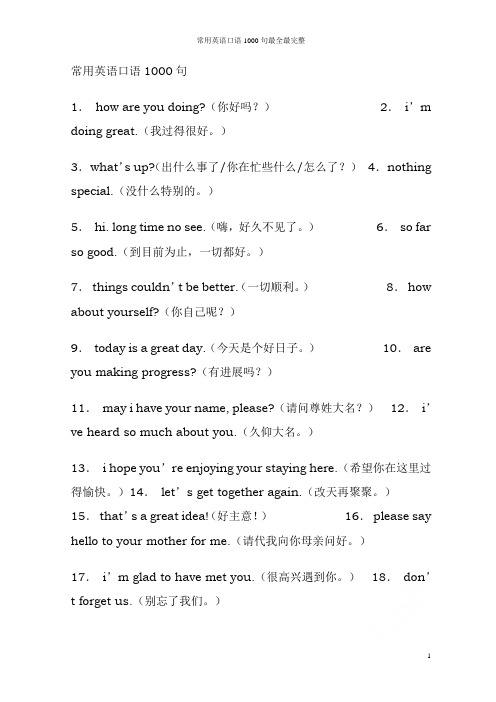
常用英语口语1000句1.how are you doing?(你好吗?)2.i’m doing great.(我过得很好。
)3.what’s up?(出什么事了/你在忙些什么/怎么了?)4.nothing special.(没什么特别的。
)5.hi. long time no see.(嗨,好久不见了。
)6.so far so good.(到目前为止,一切都好。
)7.things couldn’t be better.(一切顺利。
)8.how about yourself?(你自己呢?)9.today is a great day.(今天是个好日子。
)10.are you making progress?(有进展吗?)11.may i have your name, please?(请问尊姓大名?)12.i’ve heard so much about you.(久仰大名。
)13.i hope you’re enjoying your staying here.(希望你在这里过得愉快。
)14.let’s get together again.(改天再聚聚。
)15.that’s a great idea!(好主意!)16.please say hello to your mother for me.(请代我向你母亲问好。
)17.i’m glad to have met you.(很高兴遇到你。
)18.don’t forget us.(别忘了我们。
)19.keep in touch.(保持联系。
)20.i had a wonderful time here.(我在这里度过了难忘的时光。
)21.have a nice weekend.(周末愉快。
)22.same to you.(彼此彼此。
)23.nice talking to you.(很高兴与你聊天。
)24.take care of yourself.(自己当心/照顾好你自己。
英语口语大全

*口语表达汇总**1. Let it go! —放手吧!2. Not yet. —还没到时候。
3. Goodbye for now. —暂时再见。
4. It’s on me. —我请你。
5. After you. —您请先。
6. I must decline! —我得拒绝了。
7. That hurts. —这真的很疼。
8. Cheers! —干杯!9. Count me in. —算上我。
10. That’s impressive. —这真不错。
11. We’re the same age. —我们同龄。
12. You betrayed me! —你出卖了我!13. You owe me one. —你欠我一个人情。
14. I support you fully. —我全力支持你。
15. We’re all in agreement. —我们都同意。
16. You brought this on yourself! —这是你自找的。
17. I promise you. —我向你保证。
18. Don’t rely on me. —别指望我。
19. Don’t fall for it! —别上当!20. Easy come, easy go. —来得快,去得也快。
21. The walls have ears. —墙壁有耳。
22. Who's starting the game? —现在是谁在开局?23. Spare me that! —别给我来这一套!24. I felt a bit under the weather. —我感觉有点不舒服。
25. That’s going too far. —太过分了。
26. It’s a complete waste of time. —这真是白忙一场。
27. He tends to brag. —他总是爱吹牛。
28. Appearance matters. —人要衣装。
1000句最常用英语口语
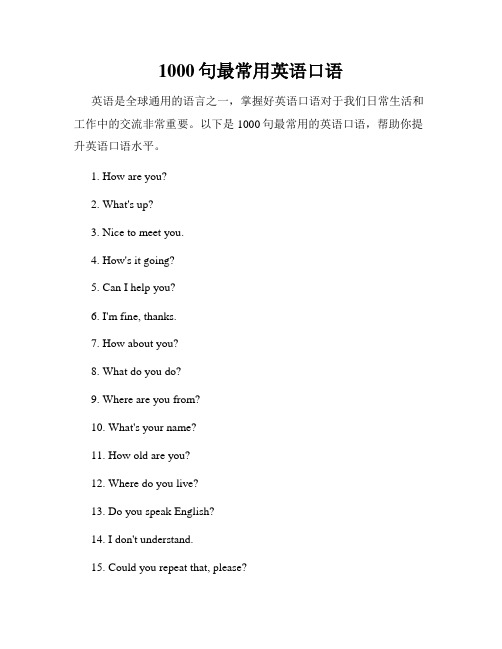
1000句最常用英语口语英语是全球通用的语言之一,掌握好英语口语对于我们日常生活和工作中的交流非常重要。
以下是1000句最常用的英语口语,帮助你提升英语口语水平。
1. How are you?2. What's up?3. Nice to meet you.4. How's it going?5. Can I help you?6. I'm fine, thanks.7. How about you?8. What do you do?9. Where are you from?10. What's your name?11. How old are you?12. Where do you live?13. Do you speak English?14. I don't understand.15. Could you repeat that, please?16. Sorry, I didn't catch that.17. Excuse me, what did you say?18. Can you speak more slowly?19. What's the time?20. How do you spell that?21. Where is the nearest bank?22. Could you show me on the map?23. How much does it cost?24. Do you accept credit cards?25. Where can I find a pharmacy?26. What's the weather like today?27. Can I try it on?28. What's the best way to get there?29. Is there an ATM nearby?30. Could you recommend a good restaurant?31. I'm lost. Can you help me?32. Can I have the bill, please?33. Do you have any recommendations?34. Can I have a glass of water, please?35. I need a doctor.36. Where's the nearest hospital?37. Can you fix this for me?38. I'd like to book a table for two.39. Is this seat taken?40. What time does the show start?41. Can I have a menu, please?42. What's your phone number?43. Can I have your email address?44. I'm sorry.45. Thank you.46. You're welcome.47. Excuse me.48. I'm sorry for the inconvenience.49. No problem.50. Have a nice day.51. Goodbye.52. See you later.53. Take care.54. I'm tired.55. I'm hungry.56. I'm thirsty.57. I'm cold.58. I'm hot.59. I'm bored.60. I'm excited.61. That's interesting.62. That's amazing.63. I love it.64. I hate it.65. I'm sorry to hear that.66. Congratulations.67. Good luck.68. What's your favorite color?69. What's your favorite food?70. What's your favorite movie?71. What's your favorite book?72. What do you like to do in your free time?73. What's your hobby?74. What's your dream job?75. What's your favorite sport?76. How was your weekend?77. How was your day?78. What's your plan for tomorrow?79. What's your plan for the weekend?80. I had a great time.81. I'm looking forward to it.82. Are you free next weekend?83. Sorry, I can't make it.84. Let's make a plan.85. Can we reschedule?86. Can you give me a ride?87. Can I borrow your pen?88. Can you do me a favor?89. Can I ask you a question?90. Can you help me with this?91. I don't know.92. I'm not sure.93. It's possible.94. It's impossible.95. I think so.96. I don't think so.97. I agree.98. I disagree.99. That's a good idea.100. That's a bad idea.101. I'm sorry, but I can't help you. 102. I'm afraid not.103. I can't believe it.104. Really?105. Are you serious?106. That's funny.107. Don't worry.108. Take your time.109. Good idea.110. That's right.111. That's wrong.112. I can't wait.113. I'm so excited.114. I'm so happy for you. 115. I'm so sorry to hear that. 116. That's not fair.117. It's none of your business. 118. Mind your own business. 119. I'm sorry, I didn't mean to. 120. It's not a big deal.121. Never mind.122. Let's forget about it. 123. It's all good.124. That's fantastic.125. That's awful.126. I'm sorry, I have to go now. 127. I'll see you soon.128. Take care of yourself. 129. Have a safe trip.130. I miss you.131. I love you.132. I'm proud of you. 133. You're the best.134. You're a genius.135. You're amazing.136. You're beautiful.137. You're handsome. 138. You're so kind.139. You're so funny.140. You're so smart.141. You're so talented. 142. You're so lucky.143. You're so brave.144. You're so strong. 145. You're so thoughtful. 146. You're so generous. 147. You're so helpful. 148. You're so understanding.149. You're so patient.150. You're so polite.这些句子是英语口语中最常用的,可以帮您在各种日常场景下更加流利地进行英语对话。
英语口语8000句系列
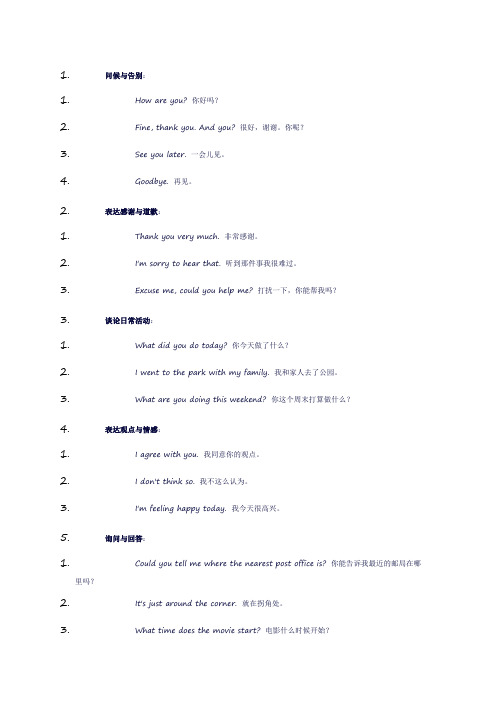
1.问候与告别:1.How are you? 你好吗?2.Fine, thank you. And you? 很好,谢谢。
你呢?3.See you later. 一会儿见。
4.Goodbye. 再见。
2.表达感谢与道歉:1.Thank you very much. 非常感谢。
2.I'm sorry to hear that. 听到那件事我很难过。
3.Excuse me, could you help me? 打扰一下,你能帮我吗?3.谈论日常活动:1.What did you do today? 你今天做了什么?2.I went to the park with my family. 我和家人去了公园。
3.What are you doing this weekend? 你这个周末打算做什么?4.表达观点与情感:1.I agree with you. 我同意你的观点。
2.I don't think so. 我不这么认为。
3.I'm feeling happy today. 我今天很高兴。
5.询问与回答:1.Could you tell me where the nearest post office is? 你能告诉我最近的邮局在哪里吗?2.It's just around the corner. 就在拐角处。
3.What time does the movie start? 电影什么时候开始?6.建议与邀请:1.Why don't we go for a walk? 我们为什么不去散步呢?2.That sounds like a good idea. 那听起来是个好主意。
3.Would you like to join us for dinner? 你愿意和我们一起吃晚饭吗?7.谈论工作与学习:1.How's work been? 工作怎么样?2.It's been busy, but good. 很忙,但还不错。
小学英语300条常用口语汇总

小学英语300条常用口语汇总1打招呼,问好1. Good morning? Good morning! 早上好?早上好!2. Good afternoon? Good afternoon! 下午好?下午好!3. How old are you? I am (four). 你几岁了?我(四)岁。
4. What is your name? My name is (lanlan) 你叫什麽名字?我叫(兰兰)。
5. See you tomorrow? See you tomorrow. 明天见?明天见。
6. Are you OK? Yes, I am OK. 你还好吗?我挺好的。
7. Hi, how are you? I am fine, thank you. 嘿,你好吗?我很好,谢谢。
8. Excuse me! 打扰一下!9. Bye-bye mum / daddy. 再见妈妈/ 爸爸。
10. Good-bye 再见。
11. Excuse me, what is your name? 打扰一下,你叫什麽名字?12. See you next week. 下周见。
2表扬,感谢1. You are beautiful! 你真漂亮!2. You are clever! 你真聪明!3. You are good! 你真棒!4. Great! / Good! / OK! 好。
5. Very nice! 非常好!6. Happy New Year! 新年快乐!7. Happy birthday! 生日快乐!8. Merry Christmas! 圣诞快乐!9. Thank you very much! 非常感谢你!10. Wonderful! 太棒了!11. I am the winner! 我是胜利者!12. I am the first! 我是第一名!13. You are beautiful! 你真漂亮!14. You are welcome! 欢迎你!15. How beautiful! 多美呀!16. How funny! 多有趣呀!17. Wow! It’s so nice! 哇!它太好了。
常用的英语对话口语100句
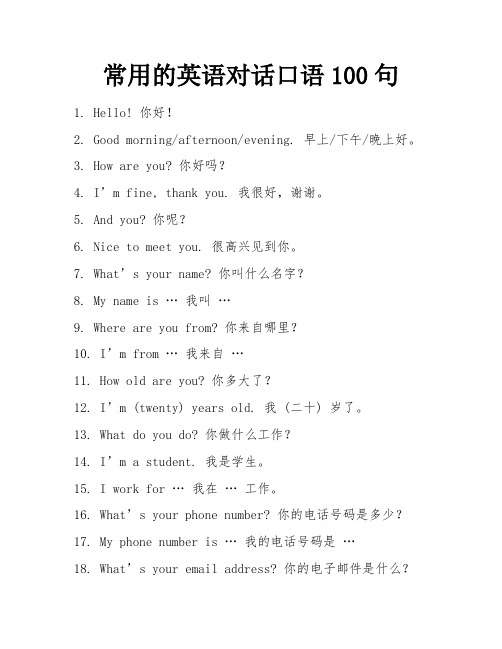
常用的英语对话口语100句1. Hello! 你好!2. Good morning/afternoon/evening. 早上/下午/晚上好。
3. How are you? 你好吗?4. I’m fine, thank you. 我很好,谢谢。
5. And you? 你呢?6. Nice to meet you. 很高兴见到你。
7. What’s your name? 你叫什么名字?8. My name is … 我叫…9. Where are you from? 你来自哪里?10. I’m from … 我来自…11. How old are you? 你多大了?12. I’m (twenty) years old. 我 (二十) 岁了。
13. What do you do? 你做什么工作?14. I’m a student. 我是学生。
15. I work for … 我在… 工作。
16. What’s your phone number? 你的电话号码是多少?17. My phone number is … 我的电话号码是…18. What’s you r email address? 你的电子邮件是什么?19. My email address is … 我的电子邮件是…20. Where do you live? 你住在哪里?21. I live in … 我住在…22. What are your hobbies? 你的爱好是什么?23. My hobbies are … 我的爱好是…24. Do you like sports? 你喜欢运动吗?25. Yes, I do. 是的,我喜欢。
26. No, I don’t. 不,我不喜欢。
27. What’s your favorite sport? 你最喜欢的运动是什么?28. My favorite sport is … 我最喜欢的运动是…29. Do you have any brothers or sisters? 你有兄弟姐妹吗?30. Yes, I do. 我有。
常用英语口语1000句
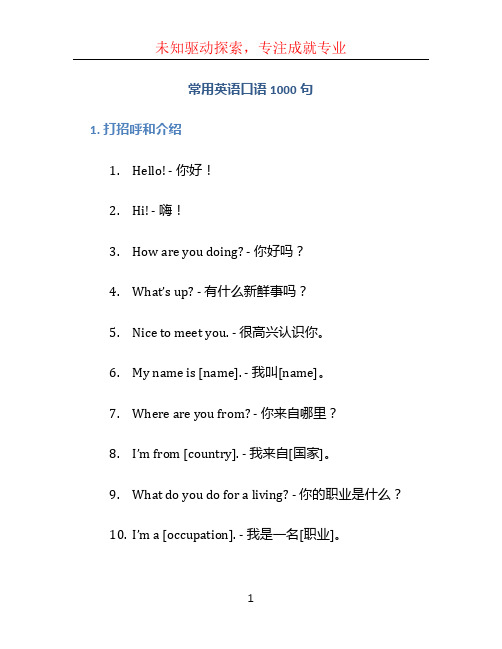
常用英语口语1000句1. 打招呼和介绍1.Hello! - 你好!2.Hi! - 嗨!3.How are you doing? - 你好吗?4.What’s up? - 有什么新鲜事吗?5.Nice to meet you. - 很高兴认识你。
6.My name is [name]. - 我叫[name]。
7.Where are you from? - 你来自哪里?8.I’m from [country]. - 我来自[国家]。
9.What do you do for a living? - 你的职业是什么?10.I’m a [occupation]. - 我是一名[职业]。
2. 礼貌用语11.Please. - 请。
12.Thank you. - 谢谢。
13.You’re welcome. - 不客气。
14.Excuse me. - 对不起。
15.I’m sorry. - 很抱歉。
16.May I help you? - 我可以帮助你吗?17.Excuse me, where is the restroom? - 请问,洗手间在哪里?18.Can you please repeat that? - 你能请再说一遍吗?19.Could you please speak more slowly? - 你能请慢一点说吗?20.I beg your pardon? - 您说什么?3. 问候和告别21.Good morning. - 早上好。
22.Good afternoon. - 下午好。
23.Good evening. - 晚上好。
24.Good night. - 晚安。
25.Have a good day! - 祝你有个愉快的一天!26.Take care. - 保重。
27.See you later. - 再见。
28.Goodbye. - 再见。
29.See you soon. - 很快见到你。
英语口语词汇大全
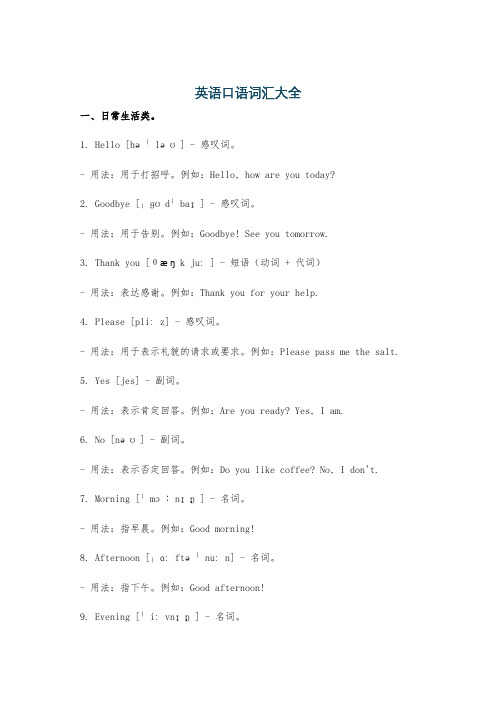
英语口语词汇大全一、日常生活类。
1. Hello [həˈləʊ] - 感叹词。
- 用法:用于打招呼。
例如:Hello, how are you today?2. Goodbye [ˌɡʊdˈbaɪ] - 感叹词。
- 用法:用于告别。
例如:Goodbye! See you tomorrow.3. Thank you [θæŋk juː] - 短语(动词 + 代词)- 用法:表达感谢。
例如:Thank you for your help.4. Please [pliːz] - 感叹词。
- 用法:用于表示礼貌的请求或要求。
例如:Please pass me the salt.5. Yes [jes] - 副词。
- 用法:表示肯定回答。
例如:Are you ready? Yes, I am.6. No [nəʊ] - 副词。
- 用法:表示否定回答。
例如:Do you like coffee? No, I don't.7. Morning [ˈmɔːnɪŋ] - 名词。
- 用法:指早晨。
例如:Good morning!8. Afternoon [ˌɑːftəˈnuːn] - 名词。
- 用法:指下午。
例如:Good afternoon!9. Evening [ˈiːvnɪŋ] - 名词。
- 用法:指晚上。
例如:Good evening!10. Night [naɪt] - 名词。
- 用法:指夜晚。
例如:Good night!11. Family [ˈfæməli] - 名词。
- 用法:指家庭、家人。
例如:My family is very big.12. Father [ˈfɑːðə(r)] - 名词。
- 用法:指父亲。
例如:My father is a kind man.13. Mother [ˈmʌðə(r)] - 名词。
- 用法:指母亲。
例如:My mother likes cooking.14. Brother [ˈbrʌðə(r)] - 名词。
- 1、下载文档前请自行甄别文档内容的完整性,平台不提供额外的编辑、内容补充、找答案等附加服务。
- 2、"仅部分预览"的文档,不可在线预览部分如存在完整性等问题,可反馈申请退款(可完整预览的文档不适用该条件!)。
- 3、如文档侵犯您的权益,请联系客服反馈,我们会尽快为您处理(人工客服工作时间:9:00-18:30)。
1 What do you know GM food? Do you think it is harmful to health? 张海洋: today, we will talk about geneic modified food, what is GM food ?王静: Genetic modification (GM) is food ,either a plant or animal.That has been altered in the laboratery by scicentist.The scientists take somthing from one plant or animal ,and add it to a different palnt or animal to make it grow in different way.李娟: Genetically modified crops?周东: Yes, that’s one of the applications by GM technology.张海洋: It is said that the GM plants may need fewer pesticides than normal plants.王静: It’s right.If insects eat the GM food,they will die.so farmers do not need to buy more pesticides,there is less pullution in the environment ,and the crops grow better,stay fresh longer. With the global population increase , feeding the world is a hard task. But GM technology is giving hope to developing countries.李娟: So, according to that, should the government spare no effort to take the program of GM food?周东: It’s hard to say. which depend on the political, social and economic climate within a region or country, different governments are responding in different ways.张海洋: As far as I know, In Europe, anti-GM food protestors have beenespecially active. Few years ago, Europe has experienced some major foods scares, Citizens do not trust government information about GM foods.王静: That is really an example. In response to the public,Europe government now requires labeling of GM foods in stores. We must not ignore the potential risks.李娟: OK, thank you today.周东: My pleasure.2 Sometimes, the same thing may seem to be different when it is observed from different perspectives? Do you think so? Share your experiences with your partners.张海洋:Today, the topic of our group is about Family planning policy,There are a lot of good family planning policy action周东:yes, it Interests of the nation to accelerate the accumulation of capital. Family planning, family planning so that national consumption for the additional population decreases, thereby accelerating the accumulation of capital.王静,:it is conducive to employment. Family planning, we can make each year to enter the working-age population decrease, thereby facilitating employment.李娟:it will help improve the quality of the population of the whole nation. Family planning, the state can be accumulated funds for education, so that more people have been more and better education and technical training, so as to achieve the purpose of improving the quality of the population of the whole nation.张海洋:it helps to optimize the allocation of resources and improve the level of per capita resources. Family planning can ease the contradiction between people, improve per capita arable land area per capita level of food.周东:it help farmers having fewer babies. Family planning to reduce the population of each family, not only can reduce household consumption, but also the main family members devote more time and energy into the development of the family economy and healthy entertainment to ensure family happiness and social stability王静:But he has a lot of side effects, we use the time to pay attention to, reasonable arrangements for the family planning policy李娟:Yes, everything has bad side, we want to be treated with caution3. Please give some advice about what we should do when faced with an epidemic.东:Epidemics are rampant throughout the whole human history, and they have caused the most devastating impacts on us. Each year, numerous epidemics break out on earth and they have such characteristicsas fast spreading and infectious.洋:What do you know of the epidemic,they have what kind of harm?静:Measles(麻疹)is an infectious disease in which the sufferer has a fever and small red spots on the face and body.Syphilis(梅毒)is a serious disease of the sex organs,which can be passed on during sexual activity and also from to child.How about you.娟:AIDS(艾滋病)is a disease of the human immune system caused by the human immunodeficiency virus(HIV).This condition progressively reduces the efffectiveness of the immune system and leaves individuals susceptible to opportunistic infections and tumors.洋:Typhoid fever(伤寒)is an infenctious disease that attacks the bowel causing fever ,severe discomfort,and often death,produced by bacteria introduced into the body by food or drink.东:Influenza(流感)is a disease which is like a bad cold but more serious.Smallpox(天花)is a serious infectious disaese,causing spots which leave marks on the skin.娟:Epidemics are harmful in many ways. For one thing, it will make people and animals seriously ill or dead, which is a great loss to the country. For example, the outbreak of SARS once killed lots of people and brought great economic loss to the whole country. What do you think?静:I agree with you.There is no cure for many kinds of epidemic diseases.Once we are infected by one of them, it is difficult to be cured. what we should do when faced with an epidemic?娟:To avoid the outbreak of some kind of epidemics as possible as we can, we should first change some unhealthy habits or customs. For example, meals served individually should be encouraged, which would reduce the possibility of the spread of germs.洋:Firstly, we should be clear about our allergens and keep away from these harmful allergens. For example, if you have food allergies, you should pay special attention to the food and taste with caution. Secondly, once you discover you have been allergic, you should see a doctor and get prompt treatment.东:Yes, I agree, you are quite right. Besides, I think I should do more exercise to improve the immune system.静:The government should learn how to deal with emergencies when an epidemic broke out. I believe as long as we treat and prevent epidemics in the right way, we will finally conquer them.4.In your opinion, what kind of people should an elite education produce? What kind of people are really needed in today’s society?李娟:Did you notice that in recent years many Chinese parents send their children to study in abroad especially in America .海洋:Y up! America not only leading in the science and the economy,Its educational system stands apart from the rest of the world.周东:Absolutely right. Err….What do you think of the graduate education in China?王静:I think there are some problems in the graduate education . Firstly ,with the expansion of enrollment ,causes postgraduate training overall decline in the quality. Secondly , students lack of independent thinking and the spirit of innovat ion, postgraduate’s training system is not perfect. Thirdly , teachers focus on impart knowledge, neglect to cultivate student’s ability to discover and solve problems ,so their integration of knowledge and practical ability are very poor.周东:teachers over emphasis on the cultivation of scientific research ability in the process of education and lack of moral education and aesthetic education for students.张海洋:What do you say make sense. These problems are very common in nowadays’ graduate education . m any Chinese people consider the higher education as elite education. but in my opinion I don’t think so.王静:It’s true. In our country, resources for elite education are very limited and students’ educational choice are not that free. Our comprehensive qualities are still need to be improved. Do you think how to enhance comprehensive qualities required in the future?李娟:I think we should keep on renewing our knowledge such as English ,computer and some other basic knowledge we must master them and optimizing(优化) our own knowledge structure, ,cultivating ourabilities of how to analysis and solve problems.周东:strengthening the ideological and moral education(加强思想道德教育),fostering our awareness of society. Improving the ability in social practice ,putting wha t we learned into use .as we all know “experience is the best teacher”. In this process we can learn to interact and cooperate with people.张海洋:We should attach importance to foster independent thinking and innovative spirit.王静:I agree with you. Those are of great importance. only in those ways can we adapt to the demands of social development.5.Do you regularly or occasionally get close to nature to escape the city noise? What kind of life do you prefer to live, the life in city or in the countryside? Why?5。
